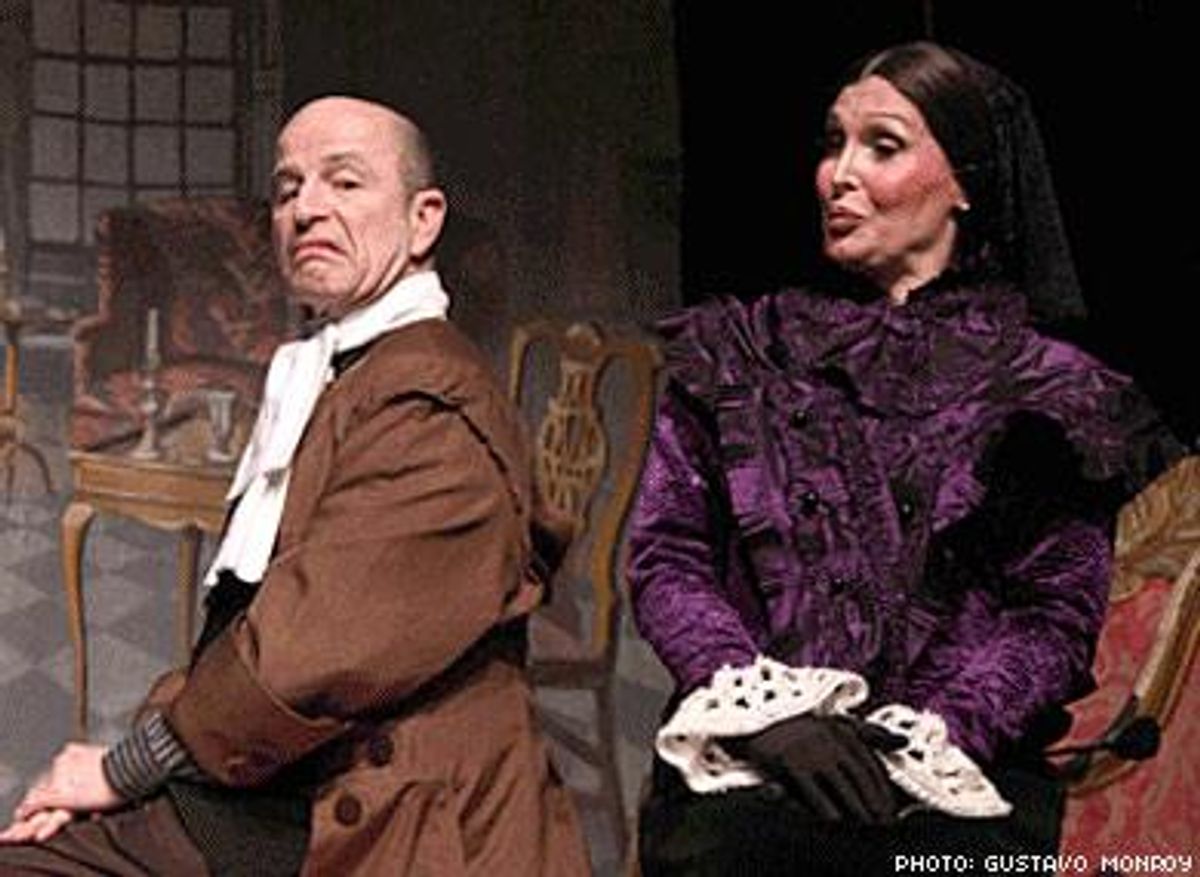New York's
current governor is blind, and its previous governor
resigned amid a call-girl scandal. But did you know
that one of its earliest, Lord Cornbury, is rumored to
have been a cross-dresser and was more than likely
gay?
Theatre
Askew's grand production of Cornbury: The
Queen's Governor will bring you up to speed.
Obie winner David
Greenspan plays the colonial governor with a knowing
and precise lilt while the Ridiculous Theatre
Company's Everett Quinton brings a
larger-than-life outrageousness to Pastor Van Dam, who works
to oust the corrupt and cross-dressing governor. At
the pastor's side in his campaign is Margareta
De Peyster, played with villainy supreme by
TransAmerica's Bianca Leigh. Mark
Beard's rich trompe l'oeil false
proscenium set, with its numerous drops and visible
fly system, offers the just right environment of
meta-tattiness.
"I felt
like I was guided towards doing this project," says
director Tim Cusack. Several years ago Cusack directed
a reading of another play by writer William M. Hoffman
when a novelist friend mentioned some curious
information she had come across on a cross-dressing colonial
governor. A week later, Cusack says he was talking to
the playwright, "and I swear to God this is
true, Bill said to me, 'Tim, I've written this
play about an early British governor who was a
cross-dresser and I think your company would be good
for it.'"
Hoffman cowrote
the play with the late Anthony Holland in the mid 1970s,
but Theatre Askew's spritely production marks its
first professional staging. Founded in 2004 by Cusack
and Jason Jacobs, the company calls itself "New
York's premiere producer of queer theater" and
has the collateral to secure such bragging rights.
Productions have twice been nominated for GLAAD Media
Awards and include Bald Diva! a
reinterpretation of Ionesco's absurdist The Bald
Soprano, with gay couples set in materialist
Chelsea, and i google myself, a dark work about
the Internet and sexual obsession.
Playwright
Hoffman, best known for As Is, the first
Broadway play to deal with AIDS, and the libretto for the
Metropolitan Opera's The Ghosts of
Versailles, says he and Holland wrote the play because
they "were pissed off no one was celebrating
anything gay for the bicentennial, so wise asses that
we were, we figured we would do a great American unknown
hero."
A complicated and
ambivalent hero, the historical record on Cornbury's
cross-dressing is much debated. Recent examinations now
claim the story is nothing more than slander spread by
his political adversaries in an attempt to discredit
him. Hoffman conducted his own exhaustive research
while writing the play and dubs it "a fantasy based
on fact" or "history as it should
be." He is firmly convinced, however, that Cornbury
was gay.
Theatre
Askew's strong audience outreach around this
production should also be applauded. Cornbury
featured post-show discussions around issues presented
in the play (full disclosure: I participated on the
gender panel) and a website featuring smartly produced
short videos about other peculiarities of New York's
early history. The company's commitment to outreach
is further evident in initiatives like T.A.Y.P.E.
(Theatre Askew's Youth Performance Experience),
which works with NYC's disadvantaged LGBTQA
youths to create performance pieces out of their
experiences.
Theatre Askew, as
Cusack describes it, strives "to create space where
everybody can be queer and express the parts of them that
don't jive with the set of expectations the
culture puts out there." The early 1700s
governor might be surprised if he saw today's New
York, but he is undoubtedly at home with Theatre
Askew.


















































































